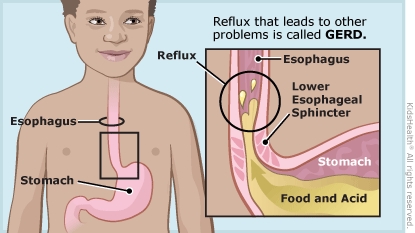Gastroesophageal Reflux Disease (GERD): How to Care for Your Child
Your child stayed in the hospital to be treated for gastroesophageal reflux disease (GERD). The medical team ran tests to help decide on the best treatment. Follow these instructions to care for your child at home.


-
If the health care provider prescribed medicine, follow the instructions carefully and give your child the medicine on schedule.
-
Check with your health care provider before giving your child any over-the-counter medicines (medicines you can buy without a prescription), including herbs and alternative medicines.
-
Help your child avoid:
-
caffeine (found in energy drinks, soda, and coffee)
-
spicy and fatty foods (such as hot sauce and French fries)
-
acidic foods and drinks (such as tomatoes and orange juice)
-
foods made with peppermint or chocolate
-
foods or drinks that make the reflux worse
-
drinking alcohol and smoking cigarettes
-
Encourage your child to eat smaller meals more often instead of three large meals.
-
Avoid eating too close to bedtime. Lying down on a full stomach can make reflux worse.
-
If your child is overweight, talk to your health care provider about how to help your child get to a healthy weight.
-
Don't let anyone smoke near your child. It can make your child's reflux worse. If anyone in your house smokes, visit www.smokefree.gov for advice on quitting or call 1-800-QUIT-NOW.

Your child:
-
does not seem to be growing
-
coughs, chokes, wheezes, or has trouble breathing
-
vomits more than a few times in a 24-hour period
-
has blood in the poop or vomit
-
still has problems with reflux after 3 months on medicine

Your child:

What is GERD? Gastroesophageal reflux — also called acid reflux or reflux — is when food and acid from the stomach go back up into the esophagus (the tube that runs from the mouth to the stomach), and sometimes out the mouth or nose. Reflux that makes a child very uncomfortable or leads to poor growth or other problems is called gastroesophageal reflux disease (GERD).
What causes reflux? Reflux happens because a ring of muscle at the bottom of the esophagus does not close all the way. This ring of muscle is called the lower esophageal sphincter (LES). If the LES does not close normally, food and fluid from the stomach can come up the esophagus and sometimes out the mouth or nose.
How is GERD diagnosed? Health care providers diagnose GERD by asking about signs of reflux, checking a child's growth, and doing tests. Tests might include:
-
blood and pee tests
-
a barium swallow: The child drinks a liquid that shows up on an X-ray so doctors can see any problems in the esophagus and stomach.
-
an upper endoscopy: A thin tube with a camera on the end is used to see inside the esophagus.